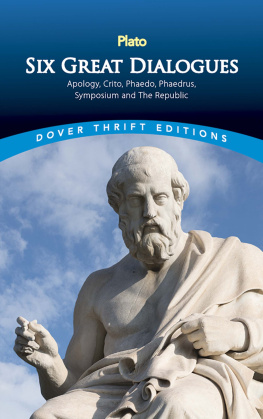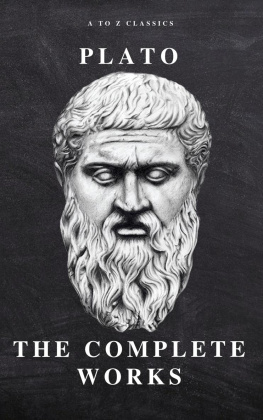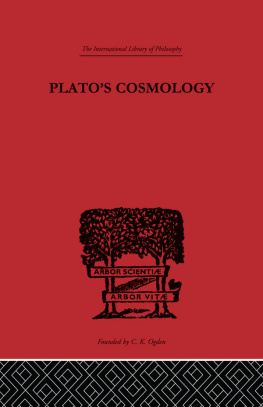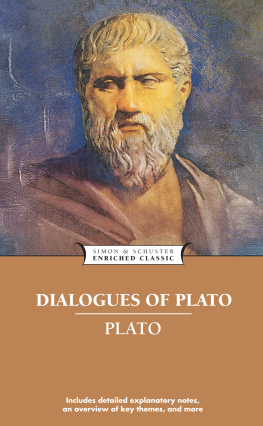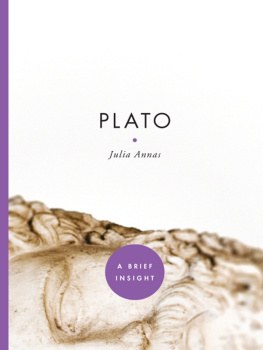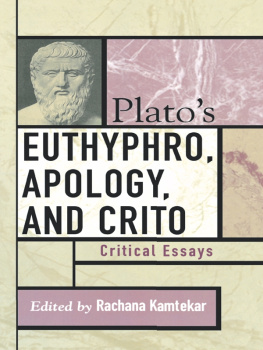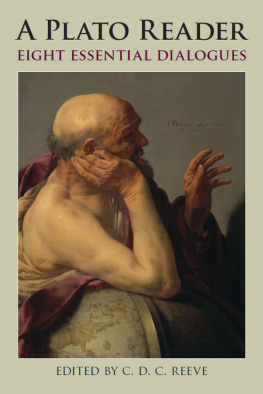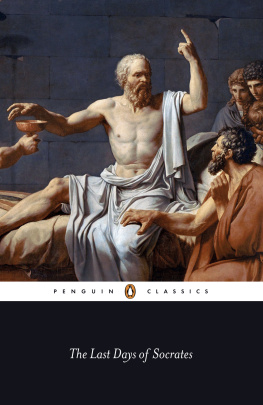Plato - Euthyphro
Here you can read online Plato - Euthyphro full text of the book (entire story) in english for free. Download pdf and epub, get meaning, cover and reviews about this ebook. genre: Science. Description of the work, (preface) as well as reviews are available. Best literature library LitArk.com created for fans of good reading and offers a wide selection of genres:
Romance novel
Science fiction
Adventure
Detective
Science
History
Home and family
Prose
Art
Politics
Computer
Non-fiction
Religion
Business
Children
Humor
Choose a favorite category and find really read worthwhile books. Enjoy immersion in the world of imagination, feel the emotions of the characters or learn something new for yourself, make an fascinating discovery.
Euthyphro: summary, description and annotation
We offer to read an annotation, description, summary or preface (depends on what the author of the book "Euthyphro" wrote himself). If you haven't found the necessary information about the book — write in the comments, we will try to find it.
Euthyphro — read online for free the complete book (whole text) full work
Below is the text of the book, divided by pages. System saving the place of the last page read, allows you to conveniently read the book "Euthyphro" online for free, without having to search again every time where you left off. Put a bookmark, and you can go to the page where you finished reading at any time.
Font size:
Interval:
Bookmark:
The Project Gutenberg EBook of Euthyphro, by Plato
This eBook is for the use of anyone anywhere at no cost and with
almost no restrictions whatsoever. You may copy it, give it away or
re-use it under the terms of the Project Gutenberg License included
with this eBook or online at www.gutenberg.org
Title: Euthyphro
Author: Plato
Translator: Benjamin Jowett
Release Date: November 23, 2008 [EBook #1642]
Language: English
*** START OF THIS PROJECT GUTENBERG EBOOK EUTHYPHRO ***
Produced by Sue Asscher, and David Widger
INTRODUCTION. EUTHYPHRO |
In the Meno, Anytus had parted from Socrates with the significant words: 'That in any city, and particularly in the city of Athens, it is easier to do men harm than to do them good;' and Socrates was anticipating another opportunity of talking with him. In the Euthyphro, Socrates is awaiting his trial for impiety. But before the trial begins, Plato would like to put the world on their trial, and convince them of ignorance in that very matter touching which Socrates is accused. An incident which may perhaps really have occurred in the family of Euthyphro, a learned Athenian diviner and soothsayer, furnishes the occasion of the discussion.
This Euthyphro and Socrates are represented as meeting in the porch of the King Archon. (Compare Theaet.) Both have legal business in hand. Socrates is defendant in a suit for impiety which Meletus has brought against him (it is remarked by the way that he is not a likely man himself to have brought a suit against another); and Euthyphro too is plaintiff in an action for murder, which he has brought against his own father. The latter has originated in the following manner:A poor dependant of the family had slain one of their domestic slaves in Naxos. The guilty person was bound and thrown into a ditch by the command of Euthyphro's father, who sent to the interpreters of religion at Athens to ask what should be done with him. Before the messenger came back the criminal had died from hunger and exposure.
This is the origin of the charge of murder which Euthyphro brings against his father. Socrates is confident that before he could have undertaken the responsibility of such a prosecution, he must have been perfectly informed of the nature of piety and impiety; and as he is going to be tried for impiety himself, he thinks that he cannot do better than learn of Euthyphro (who will be admitted by everybody, including the judges, to be an unimpeachable authority) what piety is, and what is impiety. What then is piety?
Euthyphro, who, in the abundance of his knowledge, is very willing to undertake all the responsibility, replies: That piety is doing as I do, prosecuting your father (if he is guilty) on a charge of murder; doing as the gods doas Zeus did to Cronos, and Cronos to Uranus.
Socrates has a dislike to these tales of mythology, and he fancies that this dislike of his may be the reason why he is charged with impiety. 'Are they really true?' 'Yes, they are;' and Euthyphro will gladly tell Socrates some more of them. But Socrates would like first of all to have a more satisfactory answer to the question, 'What is piety?' 'Doing as I do, charging a father with murder,' may be a single instance of piety, but can hardly be regarded as a general definition.
Euthyphro replies, that 'Piety is what is dear to the gods, and impiety is what is not dear to them.' But may there not be differences of opinion, as among men, so also among the gods? Especially, about good and evil, which have no fixed rule; and these are precisely the sort of differences which give rise to quarrels. And therefore what may be dear to one god may not be dear to another, and the same action may be both pious and impious; e.g. your chastisement of your father, Euthyphro, may be dear or pleasing to Zeus (who inflicted a similar chastisement on his own father), but not equally pleasing to Cronos or Uranus (who suffered at the hands of their sons).
Euthyphro answers that there is no difference of opinion, either among gods or men, as to the propriety of punishing a murderer. Yes, rejoins Socrates, when they know him to be a murderer; but you are assuming the point at issue. If all the circumstances of the case are considered, are you able to show that your father was guilty of murder, or that all the gods are agreed in approving of our prosecution of him? And must you not allow that what is hated by one god may be liked by another? Waiving this last, however, Socrates proposes to amend the definition, and say that 'what all the gods love is pious, and what they all hate is impious.' To this Euthyphro agrees.
Socrates proceeds to analyze the new form of the definition. He shows that in other cases the act precedes the state; e.g. the act of being carried, loved, etc. precedes the state of being carried, loved, etc., and therefore that which is dear to the gods is dear to the gods because it is first loved of them, not loved of them because it is dear to them. But the pious or holy is loved by the gods because it is pious or holy, which is equivalent to saying, that it is loved by them because it is dear to them. Here then appears to be a contradiction,Euthyphro has been giving an attribute or accident of piety only, and not the essence. Euthyphro acknowledges himself that his explanations seem to walk away or go round in a circle, like the moving figures of Daedalus, the ancestor of Socrates, who has communicated his art to his descendants.
Socrates, who is desirous of stimulating the indolent intelligence of Euthyphro, raises the question in another manner: 'Is all the pious just?' 'Yes.' 'Is all the just pious?' 'No.' 'Then what part of justice is piety?' Euthyphro replies that piety is that part of justice which 'attends' to the gods, as there is another part of justice which 'attends' to men. But what is the meaning of 'attending' to the gods? The word 'attending,' when applied to dogs, horses, and men, implies that in some way they are made better. But how do pious or holy acts make the gods any better? Euthyphro explains that he means by pious acts, acts of service or ministration. Yes; but the ministrations of the husbandman, the physician, and the builder have an end. To what end do we serve the gods, and what do we help them to accomplish? Euthyphro replies, that all these difficult questions cannot be resolved in a short time; and he would rather say simply that piety is knowing how to please the gods in word and deed, by prayers and sacrifices. In other words, says Socrates, piety is 'a science of asking and giving'asking what we want and giving what they want; in short, a mode of doing business between gods and men. But although they are the givers of all good, how can we give them any good in return? 'Nay, but we give them honour.' Then we give them not what is beneficial, but what is pleasing or dear to them; and this is the point which has been already disproved.
Socrates, although weary of the subterfuges and evasions of Euthyphro, remains unshaken in his conviction that he must know the nature of piety, or he would never have prosecuted his old father. He is still hoping that he will condescend to instruct him. But Euthyphro is in a hurry and cannot stay. And Socrates' last hope of knowing the nature of piety before he is prosecuted for impiety has disappeared. As in the Euthydemus the irony is carried on to the end.
The Euthyphro is manifestly designed to contrast the real nature of piety and impiety with the popular conceptions of them. But when the popular conceptions of them have been overthrown, Socrates does not offer any definition of his own: as in the Laches and Lysis, he prepares the way for an answer to the question which he has raised; but true to his own character, refuses to answer himself.
Font size:
Interval:
Bookmark:
Similar books «Euthyphro»
Look at similar books to Euthyphro. We have selected literature similar in name and meaning in the hope of providing readers with more options to find new, interesting, not yet read works.
Discussion, reviews of the book Euthyphro and just readers' own opinions. Leave your comments, write what you think about the work, its meaning or the main characters. Specify what exactly you liked and what you didn't like, and why you think so.




